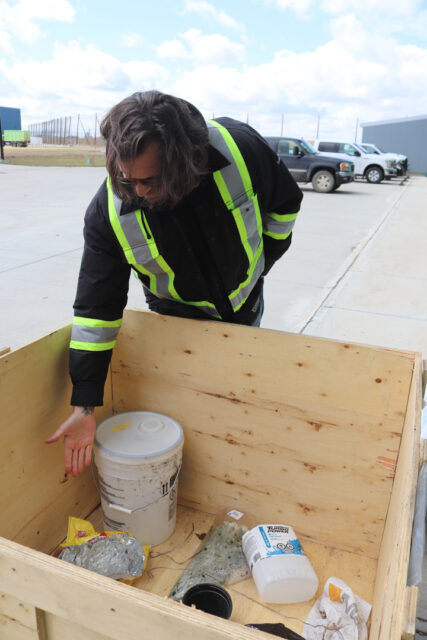City compost story worth celebrating
By Lethbridge Herald on April 23, 2025.
 Alejandra Pulido-Guzman
Alejandra Pulido-Guzman
Lethbridge Herald
After two years of collecting curbside organics, the City of Lethbridge is recognizing the community’s role in the continued success of the program.
James Nicholls, collections manager, Waste & Environment department, says the city is very excited about the success the program is having and how the number of households taking part of the program continues to increase.
“We are two years in, and we continue to see great numbers in terms of diversion rates,” says Nicholls. “We’ve hit 382 kilograms of organics diverted per household so far on average. Participation rates have increased from 85 per cent to 94 per cent, so it is good to see more people participating in the program.”
He said this amounts to nearly 13 million kg of organic waste diverted from the landfill thanks to curbside green carts so far.
“But we are still seeing about 25 to 30 per cent of organic material in the black carts. We know change can be hard to adapt to, especially when it comes to household routines,” says Nicholls. “However, the results we’ve seen are encouraging, and waste diversion will benefit our community for years to come.”
He adds that even though every household in the city has a green bin, not every household is taking part of the program. Mostly because of the yuck factor, especially during the summer months.
“For us is a matter of how we can manage that yuck factor. What are some ways that we can inform residents and give them some tools to decrease that perception of the yuk factor,” says Nicholls.
He said some things residents can do to reduce the yuck factor include using paper yard waste bags, lining the bottom of the green cart to avoid materials getting stuck to it and increasing the smell.
With the arrival of warmer weather, weekly green cart collection will resume on May 5, to help decrease the yuck factor and collect yard waste once residents begin gardening.
“Collecting every week during the warmer months allows us to help divert all the yard waste we see as people start their gardening for the year. It also helps to keep the odour or ‘yuck’ factor down in the carts.”
Eric Furgason, waste recycling co-ordinator at the waste and recycling centre, told media that generally speaking the material that comes into the centre from the green carts is very clean, but a few items still make their way through.
“We still see small rates of contamination, mostly plastic from film bags, compostable or otherwise. We get odd things like garden tools, and other pieces of metal and sometimes full bags of garbage,” says Furgason.
He said they try their best to screen those contaminants out, because as they process the incoming organic material, it gets broken down into small pieces and that makes it harder to separate after the fact.
“We usually target around 44 days between receiving and screening,” says Furgason. “We can go a little bit quicker, but it depends on the type of mix we make at the time, and environmental conditions.”
He says the compost can be used for gardening or on the lawn, as it is essentially a soil amendment that helps introduce micronutrients similar to synthetic fertilizer, but it is a natural fertilizer.
“It improves the organic health of your soil, it helps with moisture retention and the health of the plants.”
Around 24,500 kilograms of Coulee Compost have been used in city parks, gardens, cemeteries and greenspaces.
The city has given more than 56,000 kilograms of free Coulee Compost to residents at various giveaway events, with the next event being hosted during Earth Day at Legacy Park on Saturday, from 10 a.m. to 2 p.m.
Furgason adds that Coulee Compost is also available to purchase year-round from the Waste & Recycling Centre for $25 per ton and a minimum charge of $5 for amounts smaller than that.
20-19





What an inspiring story! As a Lethbridge resident, I am proud to see the community come together for the environment – it is great to see the efforts to segregate waste being recognized.
geometry dash spam